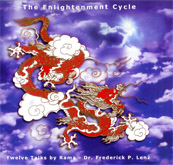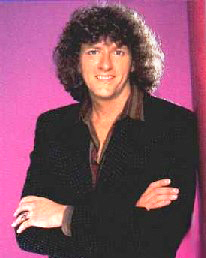
The Enlightenment Cycle
Wisdom
Wisdom. Wisdom is the ability to do two things at once - to be in the world and of it, and enjoy it and participate in it fully and successfully, and at the same time to not be here at all - to be in realms of light, to be in the super-conscious state, to be in samadhi, beyond all this. That's true wisdom.
Wisdom is the ability to take care of your life properly, to know what's right for you, to have assessed what is the right path and to follow it with heart, with your full spirit and your full mind and your full body - to not have reservations. When you do something half-heartedly, you don't get much of a result. When you do it fully, you get a great result.
Wisdom is the ability to let go. Children are wise in a funny kind of a way. Perhaps their interests aren't as vested; they haven't developed so many vested interests of self. So they can just kind of let go. They can move from one neighborhood to another, one school to another fairly easily. As they get older, it becomes more difficult. There's a wisdom, a lack of self-consciousness, that is innocence. I think innocence is the greatest wisdom.
To be wise doesn't always mean to have a wrinkled face and sparkly eyes. Usually it does. To be wise means to be still inside, to see the motions of eternity in day-to-day life and beyond this. True wisdom is freedom. True wisdom is enlightenment. At the same time, wisdom has a practical side - the ability to make good choices. The best choice anyone can make is to educate themselves. You can't be too educated. It's like in Beverly Hills - they say you can't be too thin or too rich. Well, in the world of wisdom, you can't be too wise.
Wisdom is something that seeks itself. The wiser you become, the more you realize that you'd like to know - that there is to know. There is worldly wisdom - the wisdom of success, the wisdom of achievement, how to deal with things, politics, a political sense about life. To be sharp, to be clear, to be focused, not showing all your cards, not letting anyone really know who you are or what you're like - there's a wisdom to this. Why should anyone know? It's personal. It's private, who you are. Also, if you define yourself, then you're defined. People have a fixed impression of you. They hold you in their mind a certain way, and that actually makes it difficult to change. It's very wise to be inaccessible - not to hide, but simply not to be too personal. So keep the deepest feelings of your heart to yourself. They tend to stay more pure if you do. There is a wisdom to that.
Wisdom is knowing that if you bend, you don't have to break. Sometimes it's necessary to go with the flow of life, to let life dictate experience and not necessarily allow ourselves to dictate it. In other words, let's say you wanted to build a house, and you went to a place and you had your idea of what a house should be like there, and you built that house. That's not wisdom. That's your idea of a house. Wisdom would suggest that we go to a place and feel the place - feel its presence and feel its absence. Determine if the house should be built there at all by the feelings there. What is it that the place wants? Then allow the formation of the house - the kind of house - to come through us, to allow it to be drawn out of us by the place. That's wisdom.

